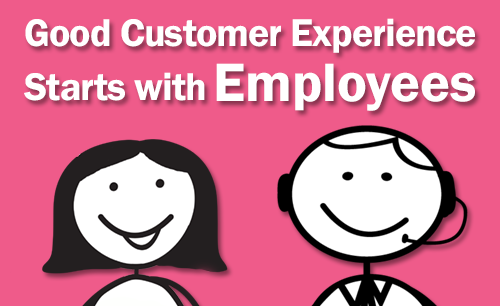Why good customer experience starts with employees

Consultancy Nunwood has just released its latest research into the experience and service offered by UK companies. Based on feedback from 7,500 consumers on 263 brands, it highlights individual success and overall trends in the UK customer experience.
The picture it offers is patchy. From the boardroom down, companies recognise the importance of the customer experience to their ongoing success. The best performers are getting better, but a large number of organisations and sectors are not improving – or are even performing worse than in 2013. This conclusion mirrors our own findings in the most recent Eptica Multichannel Customer Experience Study, which identified a widening chasm between leaders and laggards.
From reading the report, here are my top 5 conclusions:
1. The customer experience begins with staff Companies that recruit and retain evangelical, engaged employees are those that deliver a superior experience to customers. First Direct, the number one ranked company within the study, was praised for its friendly, empowered staff who combined knowledge and empathy with the ability to make discretionary decisions. First Direct recruits almost half of new staff through existing employees, and rather than looking at the financial services industry, tends to look at those with experience in the care and hospitality sectors.
2. Customer experience is a long-term project Senior management understand the importance of the customer experience – it has moved from theory into practice. But it is not necessarily easy to make changes without a long-term strategy – consequently companies that are beginning projects now may not see any benefits until 2016. Rapid improvements are possible (as seen by the entry of Nationwide and ao.com into the top 10), but this requires targeted investment in capabilities and culture.
3. The best are getting better Generally the top 10 brands have increased their lead over others in their industries. Across all 263 brands surveyed the overall improvement in performance was just 0.6%, while the likes of First Direct saw scores increase by 3-4%. Clearly many laggards are not moving forward. In highly competitive markets this is bound to impact their ability to thrive in comparison with better performing peers.
Again, like the Eptica Multichannel Customer Experience Study, some sectors are rising faster than others. Financial services (up 2.2%) and entertainment and leisure (1% higher) all improved at a faster rate than the average. In contrast utilities (down 0.8%) and grocery retail (which recorded a 0.1% drop) all took a step backward compared to 2013.
4. Customer experience is a key differentiator Consumers are increasingly demanding, meaning they expect the best possible experience from every company they deal with. Fail to deliver and they will move elsewhere. Consequently those brands that do not stand out for customer experience risk losing business to rivals, no matter how excellent the rest of their operations are.
5. Companies need to understand what excellence looks like Given it is a relatively new discipline for many brands, it can be difficult for them to set strategic goals and objectives. Working with a framework, such as Nunwood’s Six Pillars of Customer Excellence (personalisation, expectations, time & effort, integrity, resolution and empathy), gives direction to programmes and helps with measurement on the journey. You can read more about the Six Pillars in this previous Eptica blog.
As the Nunwood study points out, customer experience is now top of the management agenda for companies in all industries. Consequently it is time for laggards to invest in order to improve performance if they are to compete with customer champions in the long term.







Comments